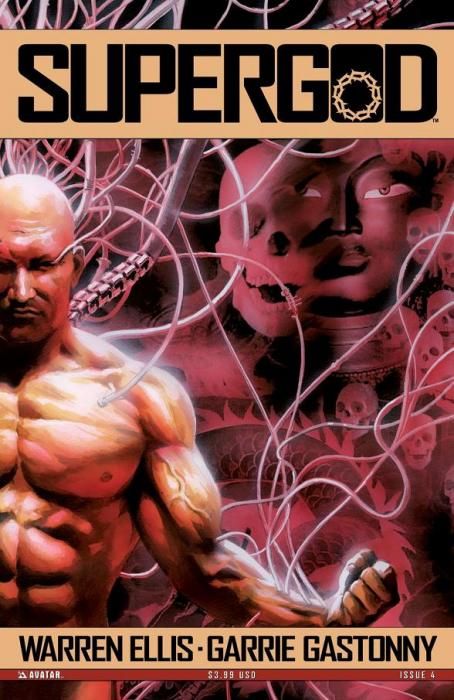I never understood other people's reactions to "Supergod." Sure, it was an oral history, a lecture in comics form, but it was interesting. It struck me that Warren Ellis was mapping out another way to approach superhumans that had only been hinted at previously: the superhuman as a completely different species. Something alien. For all of the talk of superhumans or mutants or whatever being different from humanity, they rarely act like it for the sake of making them interesting to read about month in and month out. In "Supergod," Ellis explores that idea with superhumans created to be gods, created to solve all our problems, created to be alien and inhuman. In "Supergod" #4, the supergods created finally clash and the results are apocalyptic.
The Indian supergod, Krishna has set about saving India by killing off a huge chunk of its population and sealing the country off from the rest of the world. As a result, other nations send their own superhumans to stop Krishna before its vision extends beyond India. The Russian superhuman is no match for Krishna, though their fight is quite unlike other superhuman fights that I've seen with the Russian revealing its inhumanity by the end in a startling fashion. But, it's Malak, the Iranian creation, that proves to be the most interesting opponent for Krishna.
Malak destroys things by being in their presence, leaving nothing but fiery wreckage as it walks from Iran to India. Krishna's response is startling: creating matter faster than Malak can destroy it, Krishna launches Malak into space, causing him to crash into the moon, and go straight through it, creating a gaping hole from one end to the other. The repercussions on Earth are dramatic as you can imagine.
After three issues of establishing just how alien and different these creatures are, this issue finally has them interact in a meaningful way and Garrie Gastonny does a superb job with the action. His Krishna is both terrifying and soft in his demeanor. Visually, he looks like a blue human, but his movements and reactions are contradictory and not easy to figure out on first glance. A page where his arms are cut off is brutal and beautiful. This issue is more focused and Gastonny brings a strong energy to it, pages just crackling with frenetic lines. Towards the end of the issue, the line work becomes a little less polished in places, but that works with Maitreya unforming people to create a dome of bone and flesh.
"Supergod" #4 has a stronger narrative push than past issues, but it's only following through on the ideas set forth in the first three issues. Ellis and Gastonny give a vision here of superhumans as alien beings created by humanity but not thinking like humanity. It may not seem like it at the time, but this could be one of the most worthwhile superhero comics on the oncoming decade.

